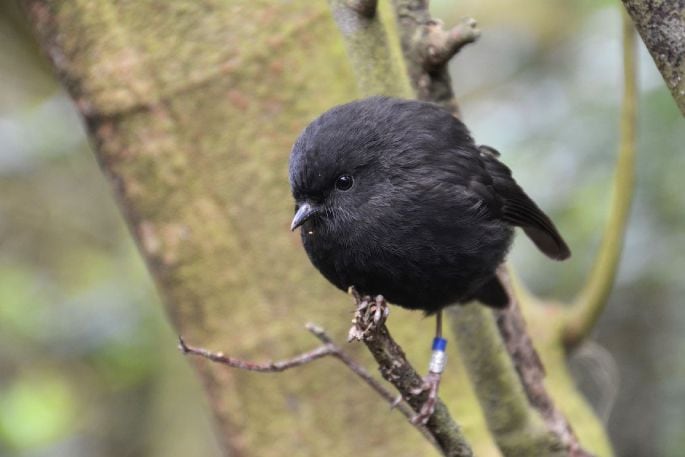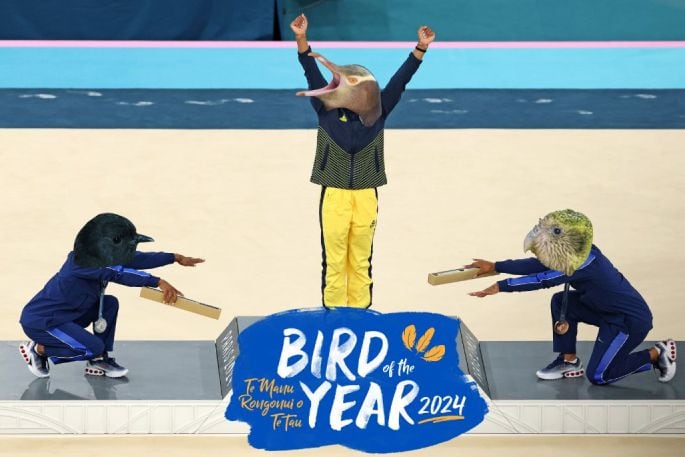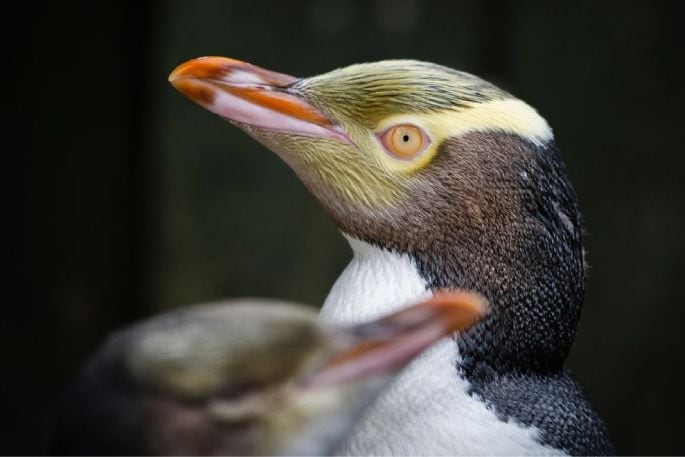The hoiho yellow-eyed penguin has won Te Manu Rongonui o Te Tau Bird of the Year 2024.
Hoiho, securing a decisive victory with 6328 votes, wears the coveted crown atop its golden head for the second time. It previously won in 2019.
The dapper flapper, whose te reo Māori name hoiho means “noise shouter”, is notoriously shy despite its loud, shrill call.
Helping hands for hoiho
A tenacious campaign propelled the penguin into first place, spearheaded by Ōtepoti Dunedin locals.
Campaign manager Charlie Buchan, marketing manager at Tūhura Otago Museum and Wild Dunedin, assembled a “dream team” of supporters including local wildlife and environmental organisations, the Highlanders rugby team, and Emerson’s Brewery, which crafted a special pale ale in honour of the “people’s penguin”.
“This is not just a win for the hoiho, but for the entire Dunedin community and the organisations working so hard to protect them,” Buchan said.
“It takes a village, and Dunedin has an amazingly supportive community that truly values its world-famous wildlife and landscapes. That’s why we’re the wildlife capital and host the New Zealand Festival of Nature.
“We worked really hard on this campaign for our awesome hoiho friends. We’re happy to fight for them and help them win.”
The hoiho also attracted big-name endorsements, including from legendary conservationist Dr Jane Goodall, former Prime Minister Helen Clark, and Labour leader Chris Hipkins.
“Huge congrats to team hoiho, whose awesome efforts and energy have championed a deserving winner,” says Forest & Bird chief executive Nicola Toki.
“In a competition that was any bird’s to win, they showed up with the goods to capture hearts and minds across Aotearoa.”
Hoiho joins the kākāpō as the only manu to have taken out the world’s favourite avian election twice. The kākāpō won in 2008 and 2020.

Karure Chatham Island black robin. Photo / Oscar Thomas.
Valiant effort by second-place karure
Hoiho surged into first place in the second week of the competition, after initially trailing the karure Chatham Island black robin.
The teeny goth robin, backed by a campaign team from Victoria University of Wellington Students’ Association (VUWSA), ultimately kept the ever-popular kākāpō at bay, securing second place.
Campaign teams across the motu crafted memes, put up posters, and donned bird costumes in efforts to win votes.
A total of 52,477 verified votes were cast by bird lovers from across Aotearoa and around the world.
Top 10 (votes)

2024 NZ Bird of the Year podium. Photo supplied.
Penguin in peril deserving of spotlight
Thought to be the world’s rarest penguin species, hoiho is unique to Aotearoa New Zealand. Small populations are dotted along the east coast of Te Waipounamu the South Island, while more live on Rakiura Stewart Island and the subantarctic Auckland and Campbell Islands.
The mainland population of hoiho is in serious trouble, and not much is known about how subantarctic hoiho are faring. The species is “nationally endangered”.
“This spotlight couldn’t have come at a better time,” says Toki. “This iconic penguin is disappearing from mainland Aotearoa before our eyes.”
According to the Yellow-Eyed Penguin Trust, the number of mainland breeding birds has dropped by 78% over the past 15 years – including an 18% dip over just the past year alone.
“Hoiho are being hammered from all angles. They suffer from horrible diseases like diphtheria and get attacked by dogs,” says Toki.
“Tiny, vulnerable chicks are threatened by introduced predators like cats, stoats and ferrets that can wipe out an entire breeding site in a single season.”
While intensive conservation efforts are helping hoiho survive on land, the penguins are at risk at sea.
“They’re drowning in set nets and can’t find enough food,” says Toki. “Our hoiho urgently need marine protected areas to give them a shot at survival.”
“The campaign has raised awareness, but what we really hope is that it brings tangible support,” says Buchan.
The hoiho campaign team led by Charlie Buchan involved Tūhura Otago Museum, Wild Dunedin, the Yellow-Eyed Penguin Trust, the Otago Peninsula Eco Restoration Alliance (OPERA), Dunedin Wildlife Hospital, and the City of Dunedin.



0 comments
Leave a Comment
You must be logged in to make a comment.